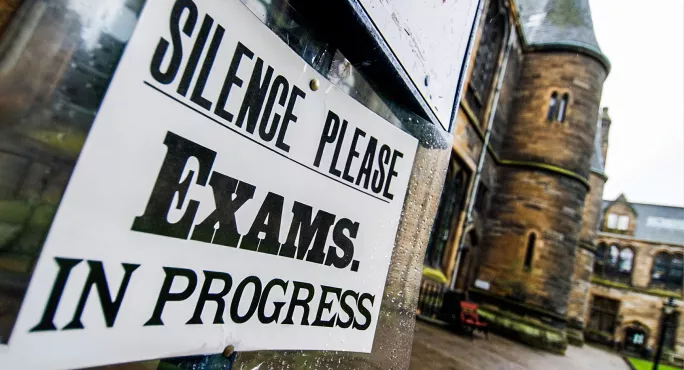How Covid has shown us the future of assessment in Scotland

Reports from the Organisation for Economic Cooperation and Development (OECD) in recent times have highlighted that young people in Scotland are perhaps among the most over-assessed in the world.
The traditional type of assessment highlighted by the OECD relates to the year-long grind of the Scottish Higher, which demands the memorisation of key facts and exam techniques to equip the young person for a test - lasting up to two hours, typically - of knowledge and skills developed over the course of the year.
For many students across Scotland, this approach will serve as a rite of passage on the way to college, university or employment. However, the reality is that this type of testing is not always best when it comes to providing evidence of attainment of key skills and abilities over any given period.
- Assessment: High-stakes exams “discredited”, say Scottish school leaders
- Context: OECD review paves the way for qualifications overhaul
- Interview: Qualifications review lead Louise Hayward outlines what happens next
- Research: The problem isn’t the qualifications - it’s resources, says the SQA
For a long time now, it has been deemed appropriate that an ongoing approach to assessment is best for practical subjects. Art portfolios and metalwork projects, for example, not only allow the student to receive continuous formative feedback throughout their course but also give them full ownership of the work: crafting, creating, engineering and innovating week in, week out, with the progress right in front of them, allowing them to consider any further necessary improvements.
The Scottish Qualifications Authority (SQA) has stated that assessment and the support around it should always reflect the type of assessment and support available to a young person after secondary school. This being the case, I can’t think of any work setting that doesn’t facilitate the opportunity to work gradually towards an outcome, overcoming problems along the way; it is standard practice that receiving feedback and advice from co-workers contributes to quality assurance.
Moving away from exams to ongoing assessment
This must also be reflected in the way we approach assessment in school - in other words, a process of ongoing collaboration between teacher and student providing assessment opportunities that are frequent and reliable.
The Covid pandemic called on us all to respond rapidly to an emergency situation: no time for consultation, no time to consider the sacrifices that would need to be made. Schools quickly rolled out online learning packages for young people and their families to access from home.
Assessments were then moved to an alternative model, much of which remains in place. Teachers would experience agency at a level so great that they would explicitly stamp the final grade on the assessment, with samples spat out centrally providing a final process of moderation. But you know what, they did it and, following a dire first attempt at it, the latest round of SQA results seem to indicate an accurate and fair representation of attainment.
Schools now find themselves treating words like “prelim” or “test” with contempt, opting for more modish terms such as “assessment windows” and “data gathering”. But however you describe it, there is no getting away from the fact that in a very short space of time we have completely revolutionised how we assess young people in our schools. It is radical and a much-needed shift in order to ensure that our young people are equipped for the world of work and employment.
Despite welcoming the commitment to ongoing assessment and regular, meaningful, feedback, I do still argue that it should be possible for some subjects and courses to include the traditional exam of one or two hours to ascertain the candidate’s ability. There remain many examples of where acquired knowledge, skills and abilities will still be called upon in a given scenario - a driving test, for example, or in making a sales pitch.
However, most of the growth necessary for young people to flourish needs to be centred around leadership, teamwork, communication and contribution. Scotland really is placed in a prime position to make such changes work. The four capacities of Curriculum for Excellence have never felt more appropriate: confident individuals, effective contributors, successful learners and responsible citizens.
And all the hallmarks of meaningful assessment years ago harnessed by Scotland’s Assessment is for Learning programme are now beginning to truly see the light of day: Covid has served as the catalyst for the full and undiluted change towards ongoing assessment, teacher agency and quality assurance across our nation’s education.
Perhaps, when we talk with our grandchildren in years to come, we will laugh with them about the one-chance, one-hour exam, and how we could ever have thought it was a meaningful representation of a student’s true and full capabilities.
Ed Carlin is a depute headteacher working in a secondary in the north-east of Scotland
You need a Tes subscription to read this article
Subscribe now to read this article and get other subscriber-only content:
- Unlimited access to all Tes magazine content
- Exclusive subscriber-only stories
- Award-winning email newsletters
Already a subscriber? Log in
You need a subscription to read this article
Subscribe now to read this article and get other subscriber-only content, including:
- Unlimited access to all Tes magazine content
- Exclusive subscriber-only stories
- Award-winning email newsletters
topics in this article



